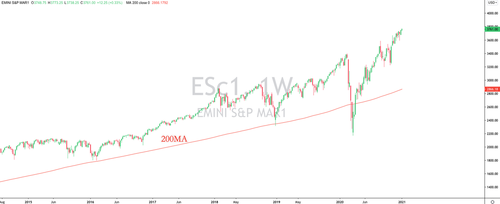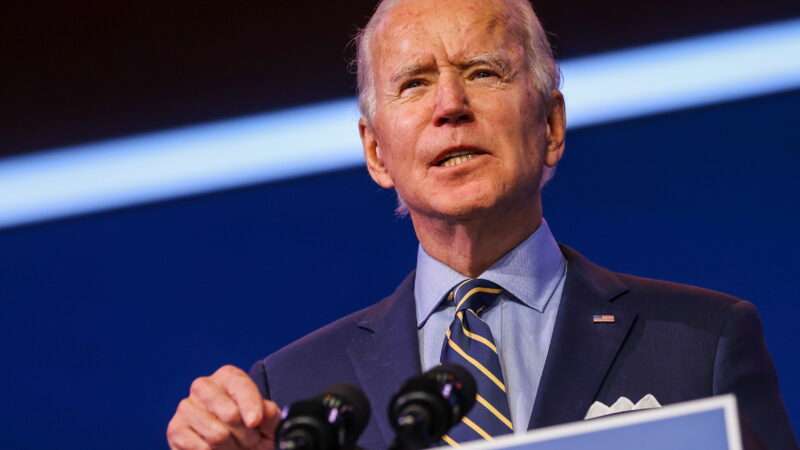
This week’s runoff elections in Georgia will determine whether Republicans can escape from the Trump era with a Senate majority intact or if President-elect Joe Biden will have a much friendlier Democratic majority in both chambers of Congress.
The two races, which conclude with in-person voting on Tuesday, will set the table for the first two years of the Biden administration. If Democratic candidates Jon Ossoff, a former journalist and political activist, and Raphael Warnock, a pastor, prevail in their races, the Senate will be evenly divided, 50–50, with incoming Vice President Kamala Harris set to be the tie-breaking vote. Meanwhile, Sen. David Perdue (R–Ga.) and Kelly Loeffler, a businesswoman, are hoping to maintain the GOP majority.
Under normal circumstances, Americans who care about limiting the size and power of the federal government would be rooting for at least one Republican victory on Tuesday. That’s not because Republicans are actually committed to limiting the size and power of the federal government, of course. It’s because a divided government means more opportunities for gridlock. The results of November’s general election weren’t so bad for anyone who likes to see both major parties lose, and Republican victories on Tuesday would keep that theme going.
But Republicans seem determined to convince voters that they ought to be exiled from political power.
Consider just the past few days. A group of Republicans led by Sen. Ted Cruz (R–Texas) announced over the weekend that they plan to object on Wednesday when the Senate goes through the usually-routine process of certifying the Electoral College vote. They are making this doomed, last-gasp bid to block Biden’s victory not because they have serious evidence of voter fraud but because they are prioritizing the outgoing president’s unhinged allegations of a stolen election over the actual functioning of the democratic process.
Meanwhile, The Washington Post has published a recording of a phone call in which Trump pressured Georgia Secretary of State Brad Raffensperger to “find” enough votes to reverse the election’s outcome. The call is appalling conduct for a sitting president, but it also isn’t surprising. For months, Trump has been trying to sow doubts about the election’s outcome and has behaved as if all Republican officials should help him achieve victory no matter what the results actually say.
Trump’s battle against reality has spilled over into the Georgia run-off elections in strange ways. As The Bulwark‘s Amanda Carpenter explained last week, Perdue and Loeffler have been forced into the awkward position of embracing Trump—the first Republican to lose a presidential election in Georgia since 1992—for fear of alienating his supporters, whose votes they will need on Tuesday. “It’s the perfect distillation of the dead-end conundrum of Trumpism: Republicans know that they can’t win without the kooks,” Carpenter wrote. “Republicans also know that they definitely might lose with them.”
In fact, Republicans might have already secured a Senate majority if not for Trump’s ill-advised campaign against voting by mail. Raffensperger, a Republican, has said as much. In November, he told Atlanta’s WSB-TV that roughly 24,000 Republicans who voted via absentee ballot in the state’s primary election did not vote at all in the general election. While they might have had other reasons for doing that, Raffensperger said Trump’s campaign to delegitimize mail-in voting likely “suppressed his own voting base.”
If those voters had participated in November. Perdue may very well have won his race without needing a run-off. Under Georgia election law, candidates must get more than 50 percent of the vote to win. Perdue got 49.73 percent.
Any political party that engages in deliberate attempts to undermine the democratic system deserves to lose. And a political party that rallies around a leader who seems to be undermining its own success is too stupid to be trusted with power.
So maybe the ideal outcome—even if an unlikely one—is a split decision.
If Republicans emerge from this run-off election with a 51–49 majority, that would still allow Senate Majority Leader Mitch McConnell (R–Ky.) to act as a needed roadblock. With a Democrat in the White House and a Democratic majority in the House, Republicans will probably rediscover their interest in fiscal conservatism. But putting that into practice—perhaps with a resurrection of the Obama-era spending caps that the Trump-era Republicans shattered—will require at least a slim GOP majority in the Senate.
A split decision Tuesday, pairing a single Republican victory with a single Republican loss, might do more to break the party’s Trump fever than a wipeout loss would. A slim Republican Senate majority would maximize the leverage of moderate Republicans like Sens. Susan Collins (R–Maine) and Mitt Romney (R–Utah)—who happen to be some of the senators least corrupted by Trumpism.
Being in the minority, on the other hand, would elevate a different set of Republican senators. Rather than feeling like they’ve narrowly survived a bout with Trumpism, the party might sink further into that morass under the weight of Trump’s grievances and (in his hardcore supporters’ eyes) political martyrdom.
It’s tempting to wish for Republicans to get swept on Tuesday. It’s what they probably deserve after the past two months, to say nothing of the past four years. But for reasons centered in politics and policy, I’ll spend Tuesday rooting—as usual—for both parties to lose.
from Latest – Reason.com https://ift.tt/3hGvTLv
via IFTTT






